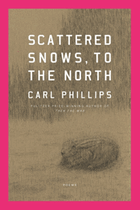
An arresting study of memory, perception, and the human condition, from the Pulitzer Prize winner Carl Phillips.
Phillips's Scattered Snows, to the North is a collection about distortion and revelation, about knowing and the unreliability of a knowing that's based on human memory. If the poet's last few books have concerned themselves with power, this one focuses on vulnerability: the usefulness of embracing it and of releasing ourselves from the need to understand our past. If we remember a thing, did it happen? If we believe it didn't, does that make our belief true?
In Scattered Snows, to the North, Phillips looks though the window of the past in order to understand the essential sameness of the human condition--"Tears / were tears," mistakes were made and regretted or not regretted, and it mattered until it didn't, the way people live until they don't. And there was also joy. And beauty. "Yet the world's still / so beautiful . . . Sometimes // it is . . ." And it was enough. And it still can be.

